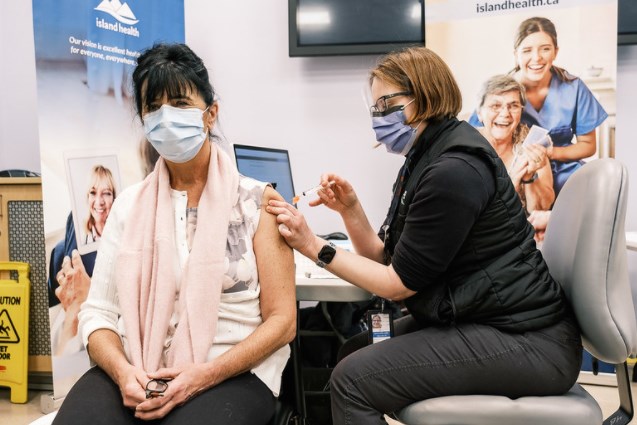The number of new cases of COVID-19 infections in B.C. appeared to level off slightly over the Christmas weekend, with confirmed new cases dropping below 400 in the last 24 hours.
Provincial Health Officer Bonnie Henry reported a total of 2,206 new cases over a five-day period dating back to Dec. 24, but the number has been falling during that time – from 512 on Dec. 24 to 382 in the last day.
However, Henry noted, it is crucial for people to remain vigilant in following health orders, since part of the reason for the drop in numbers has been a similar decline in people seeking COVID tests prior to the holidays (perhaps in an attempt to avoid having to change plans around the Christmas season).
That is why, she added, people need to remain vigilant over New Year’s Day weekend and find new ways to celebrate without endangering themselves and others.
“If we see the spread happening more rapidly like October... that would be concerning, and we would have to consider additional measures,” Henry said.
The new numbers put the figure of active COVID cases in B.C. at 7,580, with 373 people in hospital and 80 in intensive care. Another 9,414 (excluding figures from Northern Health) are currently under active monitoring, Henry said.
Fraser Health continues to be the epicentre of COVID in the province, with 1,375 new cases over the five-day period. That is followed by Vancouver Coastal Health (378), Interior Health (238), Northern Health (171) and Island Health (44).
The province also reported another 74 deaths during the five days, putting the total death count at 882.
Part of the reason for the continued heightened death toll, Henry said, is that COVID-19 outbreaks continue to ravage long-term care facilities and acute-care locations at hospitals. The five-day Christmas weekend saw another eight new outbreaks in long-term care homes, as well as two acute-care outbreaks (including one at Vancouver General Hospital).
In the meantime, 11,930 people in the province have been vaccinated – although two people did show allergic reactions to the vaccine, Henry said. Both are health-care workers who have since been treated and have recovered, and Henry noted it is not unexpected that some people will have similar allergic reactions upon receiving vaccines.
Henry also noted that the new mutated variant of the COVID virus recently discovered in Great Britain – triggering new travel bans and raising fears of a more contagious version of the virus – does not appear to be widely circulated in B.C. or Canada. The single case in B.C., as well as others around the country, have all been linked to travel to the U.K., she said.
Officials added that there may be more cases of the new variant coming, since the province has focused its more intensive genome-testing effort on travellers who have recently returned from the U.K. and have tested positive for COVID-19 – and there are several cases where the results are pending.
That is why, Henry added, people should avoid non-essential travel right now – while also adhering to the 14-day quarantine process if one does return from abroad. It is imperative that anyone in that situation get tested if symptoms emerge, she added.
“It isn’t a nice-to-do,” Henry said. “It’s a must-do.”
The concern, she added, is for the numbers to re-spike after the holiday season due to people gathering and contracting the virus – with symptoms not showing until the typical incubation period of the virus, which is 5-7 days.
“Right now in B.C., we’ve levelled off and come down a little bit,” Henry said. “But it is critical we keep doing what we are doing, and this variant is reminding us that we cannot be complacent.”





